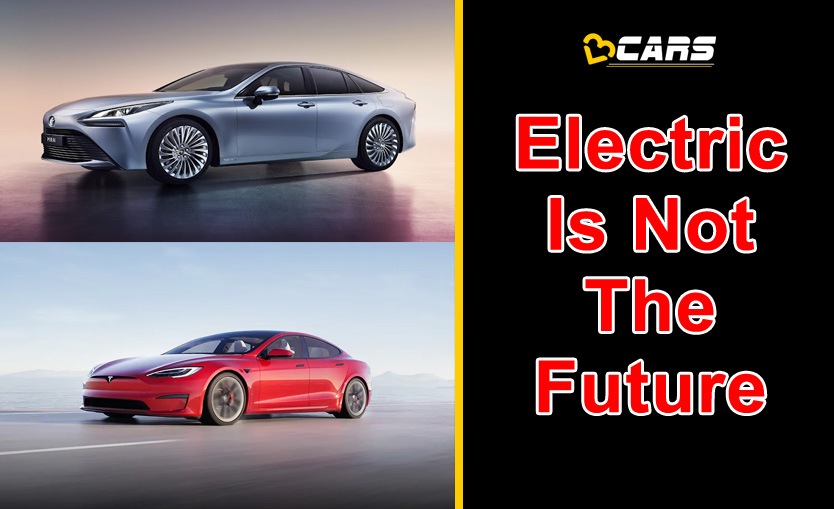5 Reasons Why Electric Is NOT The Future - Hydrogen Is | V3Cars
A recent report in New York Times with deep journalistic insights claims that Toyota are lobbying against mandating electric cars. More and more governments around the world are outlining deadlines for the end of petrol and diesel engines. Meanwhile, Toyota remain committed to hybrids before transitioning to hydrogen fuel cell vehicles.

Do you think electric cars are the future. I believe they could serve as a stop-gap solution before we move to a fuel source with energy density comparable to that of petrol and diesel. Here are my 5 reasons why hydrogen can take off as the main source of energy for transportation.
1. Weight Penalty
When you top up your fuel tank, you end up lugging that extra weight wherever you go. As you drive, the car gets lighter and it’s lightest just before gassing out.
In an electric vehicle, you’re carrying around the weight of the batteries all the time. Even when you have almost zero charge left, it’s still as heavy as it was when you unplugged it from the wall. Hence, if you choose a car with a bigger battery for a longer range, you’re paying a penalty in efficiency as you’re lugging around that extra weight 95% of the time just as insurance to save you in 5% of the situations.
But, it doesn’t matter. For a passenger car, we have probably already found a sweet balance. Around 300 - 500km is a range that’ll satisfy most car buyers. For the shipping industry, however, this loss in efficiency comes at a cost. A truck pays a shipping company’s bills, the driver’s salary, and its own maintenance and fuel costs by moving a lot of stuff from point A to B. If that truck also has to haul a 2000kg battery pack, then that’s 2000kg less cargo that it can carry and safely handle on the roads. That’s a loss-making deal.
Similarly, for aviation, large ships, and buses, it makes sense to go with something more energy-dense like hydrogen as it can carry significantly more energy per kilogram of weight.
Similarly, for a motorcycle, weight reduction is critical. A 5kg lighter motorcycle feels like it’s 20kg lighter when riding as it handles, brakes, and accelerates better. A lighter motorcycle also suffers less wear and tear and is more efficient. Here, again, it’s a lot more difficult to find that balance in range, performance, handling, upfront cost and efficiency with an electric drivetrain.
2. Charging Times
While DC fast chargers are cropping up left and right, a full top-up in an electric car is still far slower than pumping fuel into the tank. However, topping up a hydrogen tank can be just as quick as filling fuel at a petrol station.
That’s not even the darkest side of a fast charger though. A DC charger tries to push as much current into the battery as it can. This heats up the battery pack and puts it through several cycles of rapid temperature fluctuations. This cycle reduces the life of the battery pack in the long run and may force you to prematurely replace the battery.
3. No Revenue
Now let’s crunch some numbers and see how the money flows here in India.
You buy a car, which is taxed like a sin good. On a big SUV, this can be almost as much as 50%. When you buy an electric car, you pay 12% GST and little to no tax in many states.
You visit fuel stations and buy petrol or diesel, both of which carry about 250% tax depending on the crude oil prices and USD exchange rate. You will mostly charge your electric car at home. As an electric car owner, not only are you not paying your share of taxes, which you’d have paid with fuel, you’re also using subsidised electricity.
If you end up installing a solar roof at home, then you won’t even pay that subsidised rate. Finding out that the common man can power his home and run his car for free will certainly get the attention of lawmakers regardless of their political affiliations.
If you are running the government, ask yourself if you’d like to encourage people to stop paying taxes on new car purchases and fuel. Perhaps the government is under international and social pressure to go green and combat climate change. But these subsidies are only temporary at best. Sooner or later, the government will find a way to come after you and make you pay all that you “owed”.
From the manufacturers’ point of view, selling a car is barely half the story. After factoring in the R&D, shipping, advertising, salaries, loans to maintain an inventory, the lease on the dealership property and many other things, there’s very little profit to be made in terms of return on investment. When you compare that with a service centre, the difference is night and day. For a service centre, the dealer doesn’t have to pay for a flashy location, lower inventory costs and it offers consistent income with way better ROI than running a sales outlet.
With an electric car, there are fewer moving parts. So, it barely needs any routine maintenance. This will make it extremely difficult for the dealers to survive. Like a petrol or diesel car, the fuel-cell car is complex enough that people will religiously follow the service schedule. For the dealer and carmaker, the fuel cell in the car is a money-printing machine like the petrol/diesel engine.
Hence, it’s in the carmakers’ best interest to push the lawmakers towards investing in hydrogen.
4. Rare Earth Mining
You probably already know that the battery pack is the single most expensive component in an electric car. Making batteries requires mining rare earth minerals. Due to the sudden rise in demand for electric cars, there’s an equally big spike in demand for research and exploration of rare earth minerals.
Africa, reportedly, has the biggest source of rare earths right now and countries in that continent aren’t all that rich. Huge demand is likely to indirectly lead to malpractices in the mining process and the use of forced and even child labour. If news reports in the future corroborate my speculations, it could help subside demand for EVs as buyers look for ways to keep a clear conscience.
5. Toxic Waste
You could use an old car battery pack as a backup power source for your home. But eventually, it will get to a point where it’s no longer feasible to spend so much time and energy into a battery pack that can’t hold much of it. We’ll eventually have to dispose of it. That’s when we might scramble to figure out a way to save the earth from the thing that was supposed to save the earth.


0 Comments
Tata Cars in India
Punch EV
₹9.69 - ₹12.59 lakh*
*Ex-showroom pricePunch
₹5.59 - ₹10.54 lakh*
*Ex-showroom priceSierra
₹11.49 - ₹21.29 lakh*
*Ex-showroom priceHarrier EV
₹21.49 - ₹28.99 lakh*
*Ex-showroom priceAltroz
₹6.30 - ₹10.51 lakh*
*Ex-showroom priceCurvv
₹9.66 - ₹18.85 lakh*
*Ex-showroom priceCurvv EV
₹17.49 - ₹22.24 lakh*
*Ex-showroom priceHarrier
₹12.89 - ₹25.25 lakh*
*Ex-showroom priceSafari
₹13.29 - ₹25.96 lakh*
*Ex-showroom priceNexon
₹7.32 - ₹14.05 lakh*
*Ex-showroom priceNexon EV
₹12.49 - ₹17.19 lakh*
*Ex-showroom priceTigor EV
₹12.49 - ₹13.75 lakh*
*Ex-showroom priceTiago EV
₹7.99 - ₹11.14 lakh*
*Ex-showroom priceTiago NRG
₹6.68 - ₹8.10 lakh*
*Ex-showroom priceYodha Pickup
₹9.51 - ₹10.71 lakh*
*Ex-showroom priceYodha Single
Cabin 4x4
₹10.24 lakh*
*Ex-showroom priceTigor
₹5.49 - ₹8.74 lakh*
*Ex-showroom priceTiago
₹4.57 - ₹7.82 lakh*
*Ex-showroom priceUpcoming Tata Cars
Harrier Petrol
₹15.00 - ₹26.00 lakh*
*Expected PriceExpected Launch Jan 2026
Safari Petrol
₹15.50 - ₹27.00 lakh*
*Expected PriceExpected Launch Jan 2026
Punch Facelift
₹6.30 - ₹10.50 lakh*
*Expected PriceExpected Launch Jan 2026
Punch EV
Facelift
₹9.99 - ₹14.44 lakh*
*Expected PriceExpected Launch Feb 2026
Sierra EV
₹19.50 - ₹24.00 lakh*
*Expected PriceExpected Launch Sep 2026
Avinya
₹35.00 - ₹40.00 lakh*
*Expected PriceExpected Launch Jun 2027
Altroz EV
₹13.40 - ₹14.40 lakh*
*Expected PriceExpected Launch Feb 2028
Blackbird
-
*Expected PriceExpected Launch Jun 2030
Latest Tata Cars Videos
Tata Sierra vs Maruti Arena Victoris Sub Rs. 12 Lakh Battle | Which Car Is More Value For Money?
Here’s Why I Won’t Use Harrier/Safari’s Digital IRVM | Tata Safari Petrol Review
Tata Sierra Petrol Variants Explained | Smart/+, Pure/+, Adventure/+, Accomplished/+
Tata Sierra vs Mahindra Thar Roxx | Sub Rs. 13 Lakh Battle | Which Car Is More Value For Money?
Hyundai Venue vs Tata Nexon Sub Rs. 11 Lakh Battle | Which Car Is More Value For Money?
Hyundai Venue vs Tata Nexon Sub Rs. 12 Lakh Battle | Which Car Is More Value For Money?
Hyundai Venue vs Tata Nexon Sub Rs. 9 Lakh Battle | Which Car Is More Value For Money?
Tata Magic Express CNG: Highway Fuel Efficiency Test | V3Cars
Hyundai Venue vs Tata Nexon | Sub Rs. 8 Lakh Battle | Which Car Is More Value For Money?
Tata Harrier.ev 75 AWD Real-world Range Test w/ Efficiency & Drive Impressions
Altroz Important Links